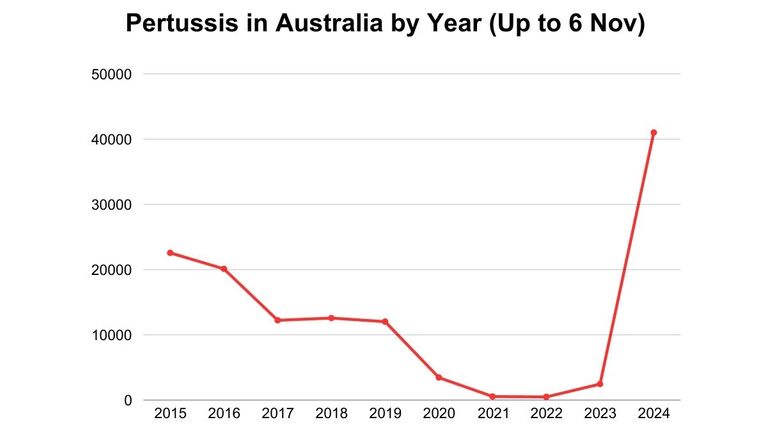News
Whooping cough epidemic reaches record numbers
GPs are urged to ensure patients have had their vaccine, as ‘staggeringly high’ cases soar to a record-breaking 41,772 so far this year.
 Australia is in the grip of the largest whooping cough epidemic since the creation of the vaccine to protect against the bacteria.
Australia is in the grip of the largest whooping cough epidemic since the creation of the vaccine to protect against the bacteria.
A whooping cough epidemic of unprecedented proportions is spreading through Australia, with more than 45,000 cases expected to be diagnosed by the end of the year.
According to data from the National Notifiable Diseases Surveillance System, notifications of pertussis have reached their highest point since a vaccine was developed.
So far this year, as of 8 November, there have been 41,772 cases of the highly infectious disease in Australia, or around 130 confirmed cases recorded every day on average.
That is compared to just 2454 cases in the entirety of 2023, 482 in 2022, and surpassing the previous record of 38,748 in 2011.
With just 53 days left of the year, the Immunisation Foundation of Australia (IFA) is now warning that those numbers could surpass 45,000 cases by the end of the year.
According to the IFA’s latest report card, released on Friday, the major spike is in school-aged children, with 40% of cases recorded in 10- to 14-year-olds.
Chair of RACGP Specific Interests Child and Young Person’s Health Dr Tim Jones told newsGP he is ‘deeply concerned about the situation’.
‘There are a lot of respiratory illnesses hammering our community right now but, out of all of them, whooping cough would be the most dangerous to our under three-month-old age range, and that’s the group that we’re fearful for at the moment,’ he said.
‘It’s definitely shocking, 15 years into being a doctor now and I have never seen a number like this, even close to that as a national number.
‘It is a staggeringly high outbreak.’

Whooping cough rates over the last 9 years. Source: IFA
IFA Founder Catherine Hughes, who established the association after the death of her son Riley from whooping cough in 2015, stressed how deadly it can be.
‘Whooping cough can be deadly for infants and can lead to severe illness in older children and adults – especially those with asthma, who are four times more likely to be infected and have a higher chance of being admitted to hospital,’ she said.
Dr Jones agrees that, even as the infection spreads through older populations, it is the youngest that are the most at risk.
‘Unfortunately, even though we’re a very developed country, we still have two babies die of pertussis every year, on average, around Australia and they’re almost always babies in the first three months of life,’ he said.
According to the data, New South Wales and Queensland have been the hardest hit – with 28% occurring in Queensland and 47% in NSW.
The areas with the lowest vaccination rates are the Gold Coast, North Coast NSW, Central Queensland, Wide Bay, Sunshine, country Western Australia and Western Queensland.
The regions with the highest vaccination rates are the Australian Capital Territory, Western NSW, Northern Sydney, Tasmania, and Western Victoria.
Dr Jones said GPs really need to act now and keep this front of mind in their practice.
‘We need to look at our children under 12, and we need to particularly be looking at kids who are under-immunised, and reaching out to those families proactively,’ he said.
‘This outbreak is not going to settle unless we start to be proactive in approaching those families.
‘We need to have a higher index of suspicion in those older kids, as with our younger kids it’s a bit easier to tell when they’ve got whooping cough.’
He said GPs should also talk about immunisation with their older patients, especially those with young children or infants at home.
‘It’s very important to be promoting boosters at the moment as an incredibly effective prevention strategy for this condition,’ Dr Jones said.
‘If we don’t act, test in those first seven to 10 days and potentially treat to reduce the spread, this outbreak is going to keep going.’
Log in below to join the conversation.
childhood immunisation children’s health children’s vaccination respiratory infections vaccination vaccine preventable disease vaccines whooping cough
newsGP weekly poll
Health practitioners found guilty of sexual misconduct will soon have the finding permanently recorded on their public register record. Do you support this change?